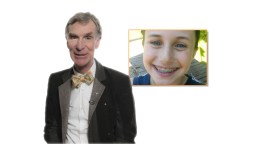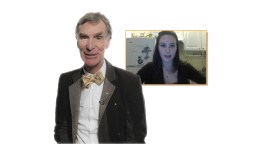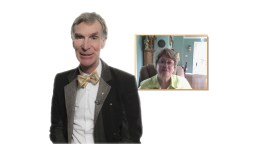Videos
All Stories
Big Think and the Mental Health Channel are proud to launch Big Thinkers on Mental Health, a new series dedicated to open discussion of anxiety, depression, and the many other psychological disorders that affect millions worldwide.
▸
6 min
—
with
Ayaan Hirsi Ali, author of “Heretic: Why Islam Needs a Reformation Now,” argues that Mohammed was a creative genius who, upon his death, froze innovation in Islam forever.
▸
5 min
—
with
In comedy, as with any form of storytelling, it’s refreshing to make a true personal connection with your audience. It’s this lesson that’s fueled the next phase of Lisa Lampanelli’s career.
▸
3 min
—
with
EPA administrator Gina McCarthy relays some of her proudest accomplishments working in the Obama administration: reducing carbon emissions, successfully pushing for more efficient vehicles, and championing renewable energy.
▸
3 min
—
with
“Today, like it or not, we’re all in sales,” says Dan Pink for Big Think+. Recognizing this is the first step to mastering the essential art of persuasion.
▸
2 min
—
with
What will the global economy look like in 2025? Dr. James Manyika runs through several likely shifts from our current situation, led by the undeniable rise of East Asia.
▸
3 min
—
with
An anonymous viewer asks Bill whether homosexuality makes sense from an evolutionary and genetic standpoint. Bill’s response? Homosexuality exists across species and none of them are dying out anytime soon.
▸
3 min
—
with
The era of companies taking care of employees for life is over. According to tech entrepreneur Maynard Webb, the new norm allows individuals more opportunities to succeed, but requires them to control their own destinies by putting themselves first.
▸
2 min
—
with
What will it take for the United States to overcome entrenched issues pertaining to race and socioeconomic status? According to poet and educator Clint Smith, the U.S. needs to be honest with itself about cultural myths (meritocracy, equal treatment by authorities, etc.) that don’t actually exist.
▸
3 min
—
with
Dr. Heidi Grant Halvorson talks about inaccurate perceptions, and how we view ourselves is often not how we come across to others.
▸
4 min
—
with
Is there intelligent life out there in the universe? Theoretical physicist Brian Greene explains why that’s a more complicated question that it appears.
▸
2 min
—
with
On this week’s Tuesdays With Bill, Lillian has the whole summer ahead of her, and wants to know what kind of science-related activities she can do outside of the classroom.
▸
3 min
—
with
People considered physically attractive enjoy many social and professional benefits others do not. But the reasons why are more complex than you might think.
▸
3 min
—
with
Jon Acuff discusses the four moments you’ll encounter in your career and the key to navigating them.
▸
4 min
—
with
Jim Whitehurst, CEO of Red Hat, explains how the cloud is evolving in a way few anticipated.
▸
2 min
—
with
Steven Kotler explains that a new device and its imitators can trigger “mystical” experiences in the brain.
▸
5 min
—
with
The best way to benefit from meditation is to start small — really small. Dr. Suzuki explains how short bursts of meditation can change the biology of your brain for the better, making you healthier and more purpose driven.
▸
3 min
—
with
Fear of offending one another is driving us apart, says the celebrated comic. That’s why we have comedy.
▸
6 min
—
with
Alexandra Wilkis Wilson, co-founder and CEO of GLAMSQUAD; cofounder of Gilt Group; and an advisor, mentor, and angel investor to startups in the New York Tech community, offers a few key tips to maximize any startup’s chances of success.
▸
3 min
—
with
All new technology is frightening, says physicist Lawrence Krauss. But there are many more reasons to welcome machine consciousness than to fear it.
▸
3 min
—
with
Lisa Bodell, founder of the innovation research and training firm futurethink, explains that with the right knowledge and tools, everyone has the power to innovate.
▸
2 min
—
with
On this week’s Tuesdays With Bill, Rachel, a Columbia University student, asks two questions for the price of one: What would happen if a human being went the speed of light, and why don’t we just eject our trash into outer space?
▸
5 min
—
with
Behavioral psychologist Dan Ariely has spent over 10 years researching human dishonesty. What are the different kinds of dishonesty? Why do we tell lies? How can one act of dishonesty escalate further?
▸
4 min
—
with
Never a stranger to offbeat or unconventional wisdom, Freakonomics co-author Stephen J. Dubner explains why it’s beneficial to pay politicians a high amount of money to encourage good behavior.
▸
3 min
—
with
Stress can be your friend, says psychologist Kelly McGonigal. It’s all a matter of how you respond to it.
▸
4 min
—
with
Forget sticks and stones: Language is powerful. Ash Beckham argues that if we want to build better communities for all stakeholders, it’s vital to frame our language around inclusion and empathy.
▸
4 min
—
with
Theoretical physicist Brian Greene gives a crash course on quantum computing in two minutes.
▸
2 min
—
with
The freedom to go from identifying as white to black isn’t afforded to blacks who would want to identify as white.
▸
3 min
—
with
So let’s talk about fracking. It isn’t a terrible idea in theory, says Bill Nye the Science Guy, but it can’t be allowed to go unregulated. This is because new technologies have promoted irresponsible fracturing practices with severe environmental and public health consequences.
▸
11 min
—
with
“Islamic extremism is an assault on the ideas of liberalism, on the idea of innovation, on women, on gays, on tolerance, on civilization,” says the author and social activist. She says if American cultural leaders like Ben Affleck can’t see this, it’s because they’re not paying attention.
▸
3 min
—
with





























